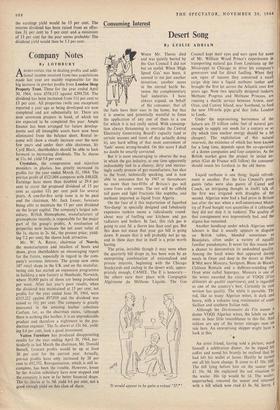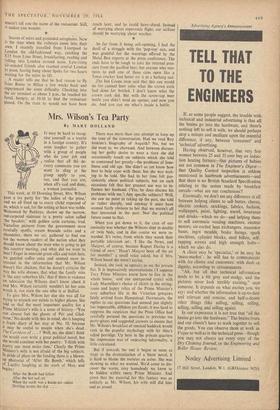Consuming Interest
Desert Song
By LESLIE ADRIAN
But it is most encouraging to observe the way in which the gas industry, at one time apparently indissolubly tied to a clumsy, dirty and increas- ingly costly process of gas manufacture, has shot to the front, technically speaking, and is now able to announce that by 1967 or thereabouts no more than two-fifths of Britain's gas will come from coke ovens. The rest will be oilfield tail gases and light fractions like naphtha, and methane imported as liquid from Algeria.
On the face of it this importation of liquefied 'fire-damp' in specially designed and fabulously expensive tankers seems a ridiculously round- about way of fuelling our kitchens and gas radiators and boilers. In fact, this rich gas is going to cost 5d. a therm less than coal gas. But this does not mean that your gas bill is going down. It means that it will probably not go up, and in these days that in itself is a prize worth having.
The prize, invisible though it may seem when the quarterly bill drops in, has been won by an enterprising combination of nationalised and private interests, beginning with the Chicago Stockyards and ending in the desert with, appro- priately enough, CAMEL. The E is honorary— the others earn their place with Compagnie Algerienne du Methane Liquide. The Gas
'It would appear to be quite a robust "57."'
Council kept their eyes and ears open for news of Mr. William Wood Prince's experiments in transporting natural gas from Louisiana up the Mississippi to Chicago to drive his company's generators and for direct fuelling. When they saw, signs of success they converted a small cargo ship into a liquid methane tanker and brought the first lot across the Atlantic over five years ago. Now two specially designed tankers, Methane Progress and Methane Princess, are running a shuttle service between Arzew, near Oran, and Canvey Island, near Southend, to feed the new 350-mile pipe grid that links London to Leeds.
Under the unpromising barrenness of the Sahara are 35 trillion cubic feet of natural gas, enough to supply our needs for a century or so (by which time nuclear energy should be a bit cheaper). The exploitation of this natural reservoir, the existence of which has been known for a long time, depends upon the co-operation of a dozen companies and four countries. As the British market gave the project its initial im- petus (Gaz de France will follow) the consumer should touch his forelock to the old therm.
Liquid methane is one thing; liquid refresh- ment is another. For the Gas Council's press guests (who were also guests of Camel and Conch, an intriguing thought in itself) talk of the first was irrigated with draughts of the second. Algerian wine had a bad press in Britain just after the war when a well-intentioned Minis- try of Food bought vast quantities of it (although they did not ship it in tankers). The quality of that consignment was impressively bad, and the stigma has remained.
Another handicap under which Algerian wine labours is that it usually appears in disguise on British tables, blended sometimes as Beaujolais, often under a variety of equally familiar pseudonyms. It never for this reason has a chance to demonstrate its undoubted quality, Among the local wines that appeared during meals in Oran and deep in the desert at Hassi R'Mel were Mascara, Savignon, Blanc de Blanes, Château Romain and a dubious-sounding red Oran wine called Supergay. Mascara is one Of the wines awarded the status of VDQS (Vin delimit& de qualite superieure), and is regarded as one of the country's best. Certainly its rosé version has quality. The white is passable. The red, like so many Algerian wines, is dark and heavy, with a volcanic tang reminiscent of some Sicilian and southern Italian reds.
Although the Dictionnaire du Vin names a dozen VDQS Algerian wines, the labels on sale seem to bear little resemblance to this list. And seldom are any of the better vintages seen orl sale here. An enterprising shipper might have a look at this.
An artist friend, having sold a picture, stood himself a celebration dinner. As he sipped his coffee and nosed his brandy he realised that he had left his wallet at home. Hastily he turned out all his loose change. It came to Ll 10s. 10d. The bill lying before him on the saucer said £1 10s. 9d. He explained the sad situation t° the waiter. His tip would be Id. The waiter, unperturbed, removed the saucer and returned with a bill which now read /1 8s. 9d. Sorry, I mustn't tell you the name of the restaurant. Still, it makes you wonder.
Season of mists and grounded aeroplanes. Now is the time when the railways come into ,their own. I recently travelled from Liverpool to London the old-fashioned way, catching the 815 from Lime Street, breakfasting, reading and rolling into London around noon. Late-rising air-minded friends also reached central London at noon, having hung about Speke for two hours Waiting for the mists to lift.
• A reader tells me that he had reason to fly from Rome to Milan a few weeks back and experienced the same difficulty. Checking into the air terminal at about 5 p.m., he reached his hotel, hungry, at 10.10 to find the restaurant closed. On the train he would not have been much later, and he could have 'dined. Instead of worrying about supersonic flight, our airlines should be worrying about weather.
So far from it being self-opening, I had the devil of a struggle with the `pop-top' can, and was grateful for the warnings offered by the Metal. Box experts at the press conference. The ends have to be tough to take the internal pres- sure from the gasified beer, but anyone who ven- tures to pull one of these cans open like a Xmas cracker had better try it in a bathing suit.
The Ind Coope man said that this can would do for canned beer sales what the crown cork had done for bottled. I don't know what the crown cork did. But with the screw-top beer bottle you didn't need an opener, and now you do. And you can see what's inside a bottle.



































 Previous page
Previous page